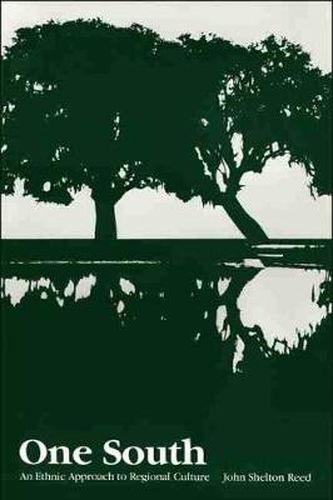Readings Newsletter
Become a Readings Member to make your shopping experience even easier.
Sign in or sign up for free!
You’re not far away from qualifying for FREE standard shipping within Australia
You’ve qualified for FREE standard shipping within Australia
The cart is loading…






This title is printed to order. This book may have been self-published. If so, we cannot guarantee the quality of the content. In the main most books will have gone through the editing process however some may not. We therefore suggest that you be aware of this before ordering this book. If in doubt check either the author or publisher’s details as we are unable to accept any returns unless they are faulty. Please contact us if you have any questions.
If it can be said that there are many Souths, wrote W. J. Cash in The Mind of the South,
the fact remains that there is also one South.
In the informal, engaging essays brought together in One South, John Shelton Reed focuses on the South’s strong regional identity and on the persistence, well into the last decades if the twentieth century, of Southern cultural distinctiveness. Reed argues that Southerners are similar in much the same way that members if an ethnic group are similar. He discusses the South’s shared cultural values, ranging from serious examinations of Southern violence and regional identity to considerations of Southern humor, country music, and the emergence of a new Southern middle class, epitomized by the family of former president Jimmy Carter.
Reed opens his volume with three essays dealing with the discipline of sociology and its relation to the South. The first essay proposes ways that sociology can contribute to the mainstream of regional studies; the second traces the history of sociological attention to the South in our century; and the this suggests that the sociological way of thinking may be somewhat alien to well-bred Southerners. In the next section, Reed looks at the question of group identity, arguing in one essay,
The Heart of Dixie,
that the South is best defined by locating Southerners, rather than by isolating a particular geographic region. Reed then turns his attention to minority and fringe groups within the South, including, in
Shalom, Y'All,
Southern Jews. A final section looks at some of the particular advantages and disadvantages of life in the New South today.
Reed’s explorations into the region’s culture reveal that Southerners are identifiable as a group less by obvious background characteristics, education, occupation, rural or urban residence, than by shared attitudes toward family and community, religious beliefs and practices, and violence and the private use of force: the kind of things that customarily identify ethnic groups. In this way, One South demonstrates how history and the heritage of Southernness have for now triumphed over the disintegrating forces of geography and economics.
$9.00 standard shipping within Australia
FREE standard shipping within Australia for orders over $100.00
Express & International shipping calculated at checkout
This title is printed to order. This book may have been self-published. If so, we cannot guarantee the quality of the content. In the main most books will have gone through the editing process however some may not. We therefore suggest that you be aware of this before ordering this book. If in doubt check either the author or publisher’s details as we are unable to accept any returns unless they are faulty. Please contact us if you have any questions.
If it can be said that there are many Souths, wrote W. J. Cash in The Mind of the South,
the fact remains that there is also one South.
In the informal, engaging essays brought together in One South, John Shelton Reed focuses on the South’s strong regional identity and on the persistence, well into the last decades if the twentieth century, of Southern cultural distinctiveness. Reed argues that Southerners are similar in much the same way that members if an ethnic group are similar. He discusses the South’s shared cultural values, ranging from serious examinations of Southern violence and regional identity to considerations of Southern humor, country music, and the emergence of a new Southern middle class, epitomized by the family of former president Jimmy Carter.
Reed opens his volume with three essays dealing with the discipline of sociology and its relation to the South. The first essay proposes ways that sociology can contribute to the mainstream of regional studies; the second traces the history of sociological attention to the South in our century; and the this suggests that the sociological way of thinking may be somewhat alien to well-bred Southerners. In the next section, Reed looks at the question of group identity, arguing in one essay,
The Heart of Dixie,
that the South is best defined by locating Southerners, rather than by isolating a particular geographic region. Reed then turns his attention to minority and fringe groups within the South, including, in
Shalom, Y'All,
Southern Jews. A final section looks at some of the particular advantages and disadvantages of life in the New South today.
Reed’s explorations into the region’s culture reveal that Southerners are identifiable as a group less by obvious background characteristics, education, occupation, rural or urban residence, than by shared attitudes toward family and community, religious beliefs and practices, and violence and the private use of force: the kind of things that customarily identify ethnic groups. In this way, One South demonstrates how history and the heritage of Southernness have for now triumphed over the disintegrating forces of geography and economics.